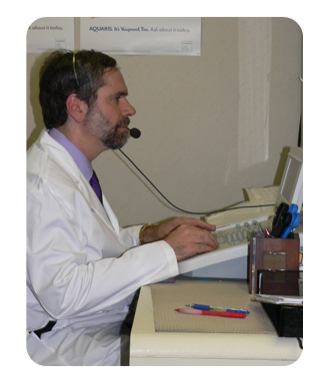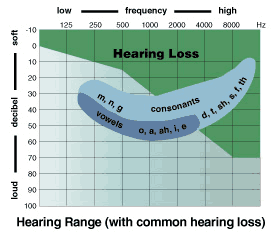Detecting Hearing Loss
Hearing loss is more common than you may think. Most hearing loss occurs, due to normal aging, or from exposure to loud or constant noise. It may be a result of certain illnesses, ear infections, medications that are ototoxic to the ear, or heredity, for example.
The most common form of hearing loss is sensorineural hearing loss, commonly referred to as “nerve loss”. This happens when the inner ear and auditory nerve do not properly transmit their signals to the brain.
Determining If There Is A Hearing Loss
It is estimated that in excess of 28 million Americans have undetected hearing loss. Hearing loss is becoming more prevalent in the younger populations, because of exposure to sounds that are too loud. This is frequently the case when headworn CD players are used, or the patient has been exposed to loud noise while attending a "rock" concert.
Otherwise, hearing loss is a part of aging. The structures of the inner ear degenerate, slowly. On the average, after age 55, the inner ear may age at the rate of 1 to 2% per year.
Most people do not complain that they are having trouble hearing. They do, however, complain when they frequently have to ask someone to repeat what was just said. This can be both annoying, and embarrassing.
Or, they feel the effects of the hearing loss when they find they no longer enjoy social events. This may include anything from attending lectures, to
church services. It is always harder to hear well in large spaces, or in groups. Of interest, the hearing impaired patient may insist they have no problem hearing, while they are being examined in the medical office. Why? Because the examining room is typically small, and quiet. The patient comments, "I can hear you just fine."
As we age, we tend to be less active, and once we are no longer in the workplace, we may not be aware of the gradual deterioration in our hearing.
The present post WWII baby boomers grew up accustomed to listening to home stereo systems, car stereo systems, and head-worn stereo systems. Over time, exposing the ears to loud levels of sound, produces high frequency hearing loss, typically in the 3000 Hz to 8000 Hz range.
Unfortunately, it is not uncommon for this type of patient to be unaware of the hearing loss. One aspect of high frequency hearing loss is the tendency for the patient to hear ringing in their ears. This is called tinnitus, and is becoming more and more prevalent in societies throughout the world.
Of interest, due to our lifestyles, the presence of hearing loss is affecting a much younger population. The under age 45 group, seems to be more at risk than the over 45 year old group. Ordinarily, hearing loss is expected after age 65, but this is no longer absolutely true.
The gradual loss of one's hearing, and the fact that hearing loss can neither be seen, nor is painful, is the reason so many people simply do not realize
their hearing has decreased. And, even if they suspect a hearing loss, many patients will not bring this to the attention of their physicians.
Do You Suspect A Hearing Loss?
If you believe you have a hearing loss, because you are missing words, and sentences, it is advisable to have your hearing tested. The hearing test, or audiogram will identify if you have a hearing loss, and the extent to which the loss is impacting you.
Here are a few items to help you determine if you are you missing important sounds:
Common Indications of Hearing Loss
- I don't hear water running from the faucet
- I have trouble understanding what is being said to me, even though I think I hear OK
- People do not seem to speak clearly. They mumble
- I really miss hearing words when I'm in a group of people
- My family accuses me of not paying attention
- Friends or family have suggested I see an ear doctor about my hearing
- My wife/husband says I have the TV on too loud
- I don't always hear the phone ring
- I admit I have trouble hearing at church or at meetings
- I ask people to repeat
- People sometimes think I'm ignoring them because I don't answer the question correctly
- I have trouble if someone is speaking behind me or walking away from me
- At social functions I hear better if I stay in a lighted area so I can see
the speakers face
If you honestly answer YES to 5 of these indicators, you most likely do have a hearing loss.


